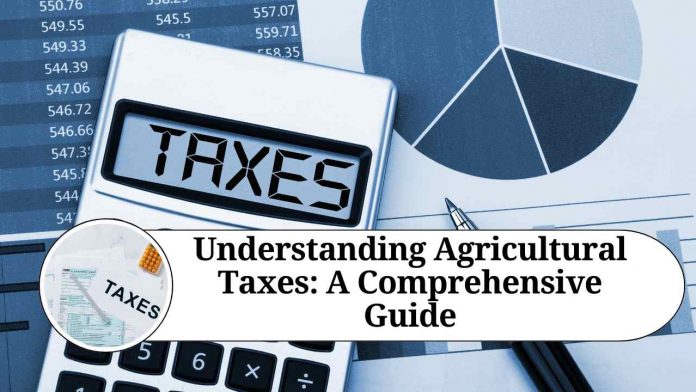Agriculture plays a significant role in the economy of many countries worldwide, with farmers providing food, fuel, and other essential products to meet the needs of the population. However, agricultural activities are also subject to various taxes, which can be confusing to understand. In this blog, we will discuss the different types of agricultural taxes and how they work.
- Property Tax Property tax is a type of tax levied on the value of land and buildings. In agriculture, property tax is usually imposed on farmland, buildings, and equipment used for farming. The tax rate is usually based on the assessed value of the property and is collected annually. Property tax revenue is used to fund local government services such as schools, roads, and emergency services.
- Sales Tax Sales tax is a tax levied on the sale of goods and services. In agriculture, sales tax is levied on the sale of agricultural products and supplies. The tax rate varies depending on the state and can range from 0% to over 10%. Sales tax revenue is used to fund state government services.
- Income Tax Income tax is a tax levied on the income earned by individuals and businesses. In agriculture, income tax is levied on the income earned by farmers from selling their products. Farmers are allowed to deduct certain expenses related to their farming activities, such as seed, fertilizer, and equipment, from their taxable income. Income tax revenue is used to fund federal government services.
- Estate Tax Estate tax is a tax levied on the transfer of property from a deceased person to their heirs. In agriculture, estate tax is often a concern for farmers who want to pass on their farmland and equipment to their children. There are various strategies that farmers can use to minimize estate tax, such as gifting property during their lifetime or setting up a trust.
- Excise Tax Excise tax is a tax levied on specific goods and services, such as gasoline, tobacco, and alcohol. In agriculture, excise tax is sometimes levied on certain agricultural products, such as tobacco and alcohol.
conclusion
Agricultural taxes are an essential part of the economy and help fund various government services. As a farmer or agricultural business owner, it is important to understand the different types of taxes that apply to your business and to ensure that you are complying with all tax regulations. By understanding agricultural taxes, you can minimize your tax burden and maximize your profits.
Other Related Blogs: Section 144B Income Tax Act
Frequently Asked Questions (FAQs)
Q: What is agricultural tax?
A: Agricultural tax is a type of tax levied on various aspects of agricultural activities, such as land, buildings, equipment, and products.
Q: Why do farmers have to pay taxes?
A: Farmers, like any other business owners, have to pay taxes to support various government services and infrastructure, such as schools, roads, and emergency services.
Q: What types of agricultural taxes are there?
A: There are several types of agricultural taxes, including property tax, sales tax, income tax, estate tax, and excise tax.
Q: How is property tax calculated for agricultural land?
A: Property tax for agricultural land is typically based on the assessed value of the land and is calculated by multiplying the assessed value by the tax rate.
Q: How much sales tax do farmers have to pay?
A: The sales tax rate for agricultural products and supplies varies depending on the state and can range from 0% to over 10%.
Q: How are income taxes calculated for farmers?
A: Income taxes for farmers are calculated by subtracting eligible business expenses from their gross income. The resulting taxable income is then subject to the applicable tax rate.
Q: Do farmers have to pay estate tax?
A: Farmers may be subject to estate tax if the total value of their assets exceeds the exemption threshold, which varies depending on the year and is subject to change.
Q: Can farmers use tax deductions to lower their tax burden?
A: Yes, farmers can use various tax deductions and credits to reduce their taxable income and lower their tax burden.
Q: What are some common tax strategies for farmers?
A: Common tax strategies for farmers include keeping accurate records, maximizing deductions, planning for estate taxes, and seeking professional tax advice.
Q: What happens if farmers fail to pay their taxes?
A: Failure to pay agricultural taxes can result in penalties, interest charges, and legal action by the government. It is important for farmers to stay up-to-date on their tax obligations to avoid any negative consequences.




















